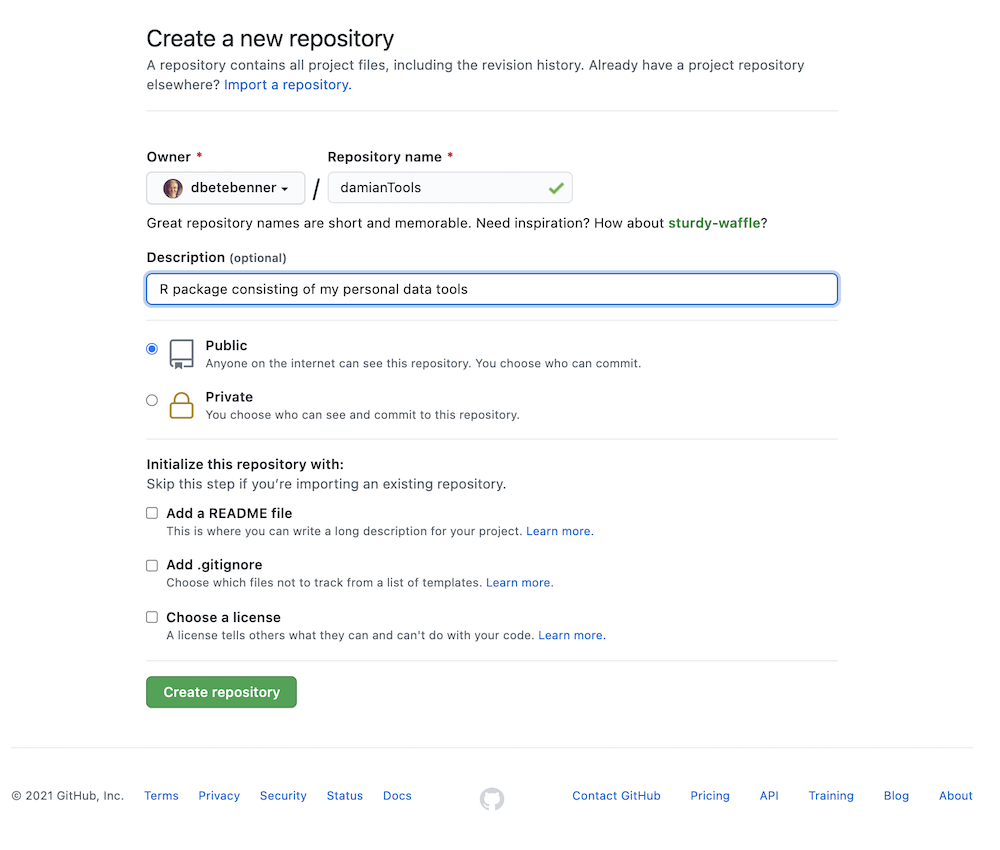Getting started with packageSkeletonForR
Damian W Betebenner
June 22nd, 2021
The packageSkeletonForR is both a GitHub version control repository, and associated GitHub hosted static website as well as an R package. The combination of GitHub and R together is a super-power skill to develop if you have a serious interest in data analysis.
The following steps are meant to help you get set up:
Step 0: Make sure you have the basics
You’ll need to have software installed and access to GitHub to make all of this work.
- Have R >= 4.0 installed. If you use RStudio, make sure to update it to the latest version.
- Make sure you have a GitHub account with a username and password.
- Update all your R packages that you have installed:
update.packages(ask=FALSE) - You’ll need to install several R packages to make all of this work:
-
devtools:
install.packages("devtools") -
packagePages:
devtools::install_github("centerforassessment/packagePages") -
centerPackageTemplate:
devtools::install_github("centerforassessment/centerPackageTemplate")
-
devtools:
Step 1: Clone the GitHub repository
The contents of this repo need to be cloned to your local computer/device. This is done by cloning the repo. Don’t fork the repo as you won’t be contributing to this package skeleton (at least I don’t expect you will — however that’s OK too) but instead will be using this as a starting point to create your own customzed R package/GitHub repo that will, ideally, be quite different.
Step 2: Create a repo in your account for your package
Go to your personal (or institutional) GitHub page, look for the repositories tab and click on the new button to start creating a new repo that will house the source code for your R package. Here’s a screenshot from my initial setup:

Step 3: Have fun customizing the package
The packageSkeletonForR package is a super simple R package that contains just two functions for illustration purposes: strHead and strTail. These two functions take the first n characters of the head or tail of a character string (or a vector of character strings), respectively. They are the analogs of the R functions head and tail but for strings. You’re welcome to keep these functions or remove them.
Some things you should do:
- Change the name of the package from
packageSkeletonForRto something you want (in these instructions we’ll call ismyPackageName). Throughout the package change any occurrence ofpackageSkeletonForRto the name you pick. - Add additional functions to the package.
- For each new function you add, update the
NAMESPACE(export the function) and document the function in theman(manual) folder. Examine the currentNAMESPACEandmanfolder contents to see how that is done. - Update the
NEWS.mdandNEWSfiles indicating changes to the package. NEWS.md is used for the static website and, ideally, will just be a copy ofNEWS. - Add a vignette to the
vignettesfolder. Use the basic vignette (packageSkeletonForR.Rmd) in the folder as a starter. - Change the version number in
DESCRIPTION,inst/CITATION,man/packageSkeletonForR.Rmd(last file should be named the package name you picked).
Step 4: Compile your package locally
To make sure everything is working (be prepared to have some things not work) build your package locally. If you’re using RStudio, there are capabilities to build the package embedded into the user interface. If you are using
Step 5: Update your package website
Step 6: Push your package to GitHub and set up GitHub
You’ll need to create a GitHub repo in your account for myPackageName.
GitHub is rapidly evolving into much more than a website to do version control. For each repo, one can set up:
- A static website that can be used in many ways including documentation of the R package, demonstrating the R package capabilities,
- Process to build the package and test whether the build has any issues. The build processes on GitHub allow one to build against different OS platforms as well as against the current development version of R (which is required if you want to post to CRAN).
Another huge benefit of using GitHub to build your package is that you can immediately share your package with others without necessarily posting the package to CRAN. packageSkeletonForR is a functional R package and can be installed from GitHub just like any other R package via:
devtools::install_github("CenterForAssessment/packageSkeletonForR")or
remotes::install_github("CenterForAssessment/packageSkeletonForR")Once you get the package set up in your own repository, your package will be able to be installed similarly. In our work we have functional development versions of the package available via GitHub and periodically post a big release version on CRAN just to keep that up-to-date.
Contributions & Requests
The packageSkeletonForR Package is crafted with :heart: by:
I love feedback and am happy to answer questions. Feel free to clone and make a pull request with the specifications for other languages.